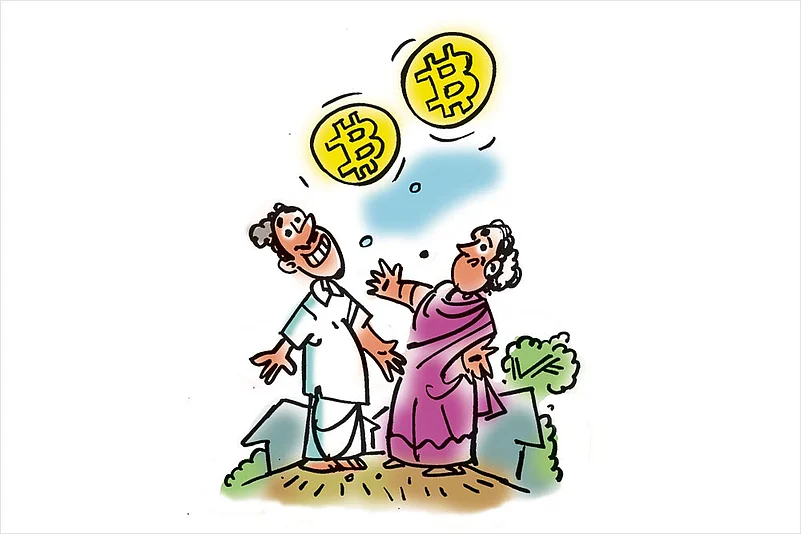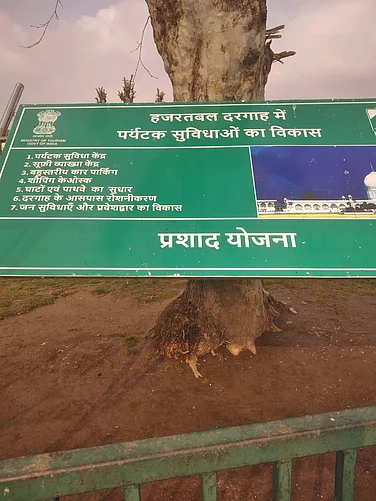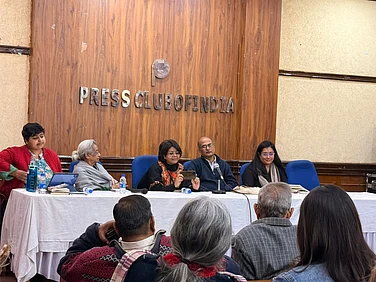Bit Bubble In Little Village
Even as the world waited on tenterhooks for the Bitcoin bubble to burst, residents of Allithurai village outside Tiruchirappalli in Tamil Nadu continued to invest in the cryptocurrency. After a visit by a few agents last year, some villagers decided to take the plunge; others were cautious. Being largely computer-illiterate, they entrust their money to agents who manage the investments, and only need to check their bank accounts at the end of each month to check out profits, which encouraged others to invest. Said Mahalakshmi, a schoolteacher who has had success with the investments, “I invested in Bitcoins through an agent. After finding how much I made, my sister Vijayalakshmi also pledged her assets to invest through the same agent.” The value of Bitcoin has gone down further since this was reported.
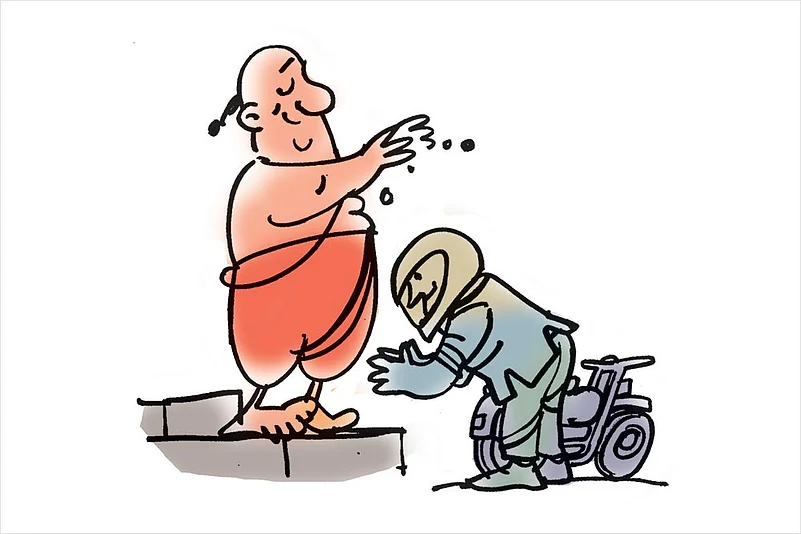
Maa Sarala’s Traffic Pujaris
When you go to get your new motorcycle blessed at the Maa Sarala temple in Orissa’s Jagatsinghpur district, you had better not forget your helmet; if you do, the priests will have no choice but to turn you away. Such rituals have become well-established in the area, with local police estimating that ten vehicles are brought to the temple for puja each day on average, with the number shooting up to 50 on occasions like Sankranti. As 13,203 out of 16,004 vehicles registered in the district are two-wheelers, and due to the number of road accident fatalities, the police contacted the temple’s priests, who agreed not to bless two-wheelers unless owners brought helmets. Head priest Sudam Charan Panda affirmed his intention to implement the strategy in co-ordination with the police.

La Vie En Rose
Rani is living the high life in Marseilles. French artist Lucie Lefevre, 28 spotted the stray on a beach in Mumbai’s Versova neighbourhood last year. “She (Rani) lived on the street near my art studio in Versova. I became super close to her, feeding her and petting her every day. She began to sleep under my legs while I was painting in the studio’s yard. I decided to adopt her because I couldn’t leave her behind. We chose each other,” said Lefevre. Taking the dog back home to France would require extensive paperwork, so Lefevre approached the Mumbai NGO Animals Matter To Me, who spent eight months preparing the documents and getting everything cleared. Now, Rani lives with Lefevre, her fiancé Pierre and their pet cat Pablo, enjoys walks on Marseilles’s beach and accompanies the artist to her studio every day.

Post-Mortem Mutilation
Thirteen tribal protesters were shot dead by the police during the Kalinganagar agitation in Orissa in 2006. Five of the bodies had their hands severed, and these are still preserved, locked in a trunk. Despite requests from the community, no DNA tests have been done to identify these so they can be returned and buried with the bodies. “The hands were removed as no one was claiming the bodies. We needed fingerprints for identification,” explained a police officer. But Orissa’s former DGP Amiya Bhushan Tripathy said, “Chopping palms (for fingerprints) was unnecessary. I have never heard of this elsewhere.” The victims are commemorated annually on January 2, with 15,000 attending the occasion this year. Young members of the community point to the silence of politicians and promise to carry on the struggle.
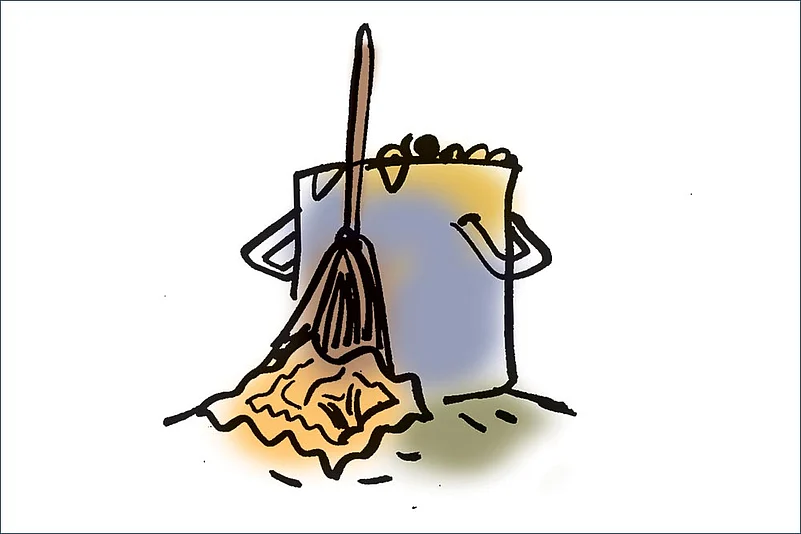
Andhra’s Aswachh Ambassador
The Andhra Pradesh government had issued a letter to singer Kesiraju Srinivas, popularly known as ‘Ghazal Srinivas’, appointing him Swachh Andhra ambassador, when he was arrested on a charge of sexual harassment. The appointment was promptly withdrawn. But perhaps he can take comfort in the fact that he is the only one to have got even this far. Many famous names had done the rounds: Amitabh Bachchan for medical ambassador, Ajay Devgn and Kajol as tourism ambassadors. None of them received formal appointment letters, although a wag was quoted in the press as saying that they had all actually refused to accept the letters. As of now, the diplomatic corps seems woefully understaffed.
Idlis From The Netherworld
An eating competition in Tamil Nadu took a tragic turn when a participant died choking on his 12th idli. The Bharathiyar Youth Association of Pandikudi village in Pudukottai district had organised a chilli-eating contest as part of Pongal festivities. When it failed to attract contenders, they decided on the idli-eating competition. The challenge was to eat as many idlis as possible in three minutes without taking any drinks of water. Chinnathambi, a 42-year-old cook was being cheered on by an enthusiastic crowd when he collapsed. He had already died by the time an ambulance arrived.
No Tears For Pakistan
A sacred pond, believed to have been formed from the teardrops of Shiva, ringed with ancient/medieval temples and the remains of a Buddhist stupa. The temple pond or ‘amrit kund’ of Katas (from kataaksha) Raj temple complex in Pakistan’s Punjab is drying up, as local cement factories use up groundwater. A well has already run dry, and last summer the pond itself came close. It is now being supplied with water piped from a nearby source. Renovation work was inaugurated by L.K. Advani during a 2005 visit, but work was not finished. The pipes were installed last year by the government after Pakistan’s Supreme Court pulled it up over poor maintenance of the complex.

A Return To Tyburn
At a time when the world is trying to move away from capital punishment, Pakistani lawmakers are trying to build opinion to make public hanging a practice as an effective deterrent for heinous crimes. The immediate provocation for the controversial move has been the rape and murder of a six-year-old girl in Lahore’s Kasur area. The hapless child, Zainub’s rapist and killer was identified as 23-year-old “serial killer” Imran Ali, who has since been arrested.
Predictably, the child’s rape and death had led to massive public outrage, with regular demonstrations and candle-light vigils being held by the citizenry demanding urgent justice.
Punjab chief minister Shahbaz Sharif himself addressed a press conference on Tuesday night to announce “key suspect” Imran Ali’s arrest, indicating how serious and sensitive the case had become for the local government.
Sharif claimed the suspect was a serial killer who had been accused also of the rape and murder of six to seven other girls in the past years.
“Our collective effort has borne fruit and the murderer has been arrested,” a triumphant Sharif announced to loud applause.
Playing to the gallery, Sharif also announced, “If it were up to me, as a person who understands some of [Zainab’s father’s] pain, I would want him hanged at the public square.” He pointed out that he will request the chief justice of Lahore High Court (LHC) to ensure that the culprit is made an example of.
The last public hanging of a convict charged with the rape and murder of a child was during military dictator Zia-ul-Haq’s rule. Recalling the 1981 public hanging of the rapist and murderer, some commentators argued that after that there were no other such crimes in the country for at least a decade. The demand, therefore, is now to have an equally effective deterrent.
Though public hanging is permissible as per Islamic law, many are questioning whether Pakistan—still conflict-ridden about its emergence as a progressive democracy—can afford to support such a primitive sense of justice.
Much of the public utterances of Shahbaz Sharif or other Pakistani leaders can be dismissed as rhetoric aimed at addressing and assuaging public outrage on a sensitive issue in an election year.
Illustrations by Sajith Kumar






